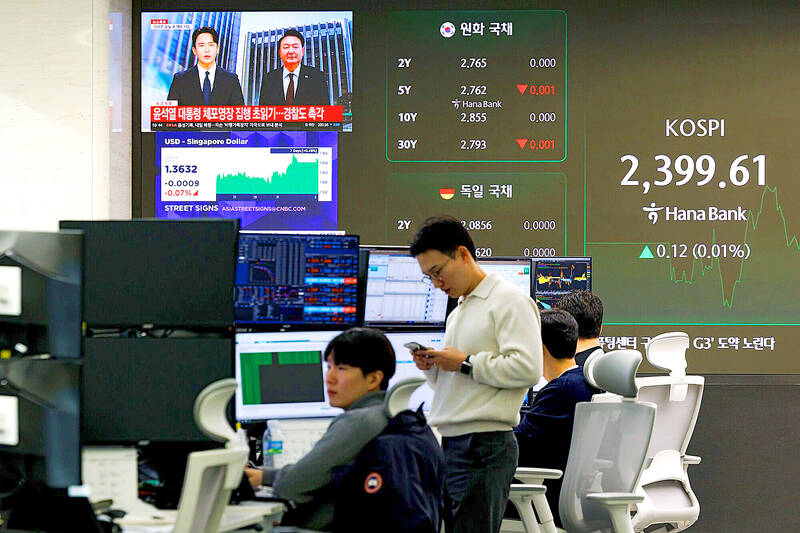South Korea cut its economic growth forecast for this year, reflecting the fallout from impeached President Yoon Suk-yeol’s martial law debacle and risks on the trade-reliant nation from US president-elect Donald Trump’s tariff plans.
The South Korean Ministry of Economy and Finance now sees the economy growing 1.8 percent this year after expanding 2.1 percent last year, it said in a statement yesterday. Those projections are down from July’s forecasts of 2.2 percent and 2.6 percent respectively, and underscore the pressure from weaker private consumption and easing export momentum.
Global uncertainties are a key risk for South Korea, as demand for memory chips might face a correction, and competition among export-reliant economies is intensifying, the ministry said. It also pointed to ongoing concerns about capital outflows to the US and the country’s political situation.

Photo: Bloomberg
The government’s outlook for this year is 0.1 percentage points lower than the view offered by the Bank of Korea (BOK) in November.
The BOK and government have pledged to offer unlimited liquidity if needed to limit the economic fallout from the political crisis. Speculation is growing among some economists that the BOK might lower its benchmark rate this month, in what would be a third consecutive cut since a policy pivot in October last year.
The BOK vowed yesterday to take a flexible approach to future rate cuts while closely monitoring risks amid increased political and economic uncertainty. It also said it is hard to stabilize the economy with monetary policy alone.
There is a growing chance that GDP might contract at the start of this year, and the economy might end up expanding less than 1.7 percent this year, iM Securities Co analyst Park Sang-hyun said in a note.
“If exports slow down, especially semiconductors, amid a deteriorating economy that is not expected to improve anytime soon, downside risks to domestic GDP growth in the first quarter of 2025 are likely to increase,” he said.

NEW IDENTITY: Known for its software, India has expanded into hardware, with its semiconductor industry growing from US$38bn in 2023 to US$45bn to US$50bn India on Saturday inaugurated its first semiconductor assembly and test facility, a milestone in the government’s push to reduce dependence on foreign chipmakers and stake a claim in a sector dominated by China. Indian Prime Minister Narendra Modi opened US firm Micron Technology Inc’s semiconductor assembly, test and packaging unit in his home state of Gujarat, hailing the “dawn of a new era” for India’s technology ambitions. “When young Indians look back in the future, they will see this decade as the turning point in our tech future,” Modi told the event, which was broadcast on his YouTube channel. The plant would convert

‘SEISMIC SHIFT’: The researcher forecast there would be about 1.1 billion mobile shipments this year, down from 1.26 billion the prior year and erasing years of gains The global smartphone market is expected to contract 12.9 percent this year due to the unprecedented memorychip shortage, marking “a crisis like no other,” researcher International Data Corp (IDC) said. The new forecast, a dramatic revision down from earlier estimates, gives the latest accounting of the ongoing memory crunch that is affecting every corner of the electronics industry. The demand for advanced memory to power artificial intelligence (AI) tasks has drained global supply until well into next year and jeopardizes the business model of many smartphone makers. IDC forecast about 1.1 billion mobile shipments this year, down from 1.26 billion the prior

People stand in a Pokemon store in Tokyo on Thursday. One of the world highest-grossing franchises is celebrated its 30th anniversary yesterday.

Zimbabwe’s ban on raw lithium exports is forcing Chinese miners to rethink their strategy, speeding up plans to process the metal locally instead of shipping it to China’s vast rechargeable battery industry. The country is Africa’s largest lithium producer and has one of the world’s largest reserves, according to the US Geological Survey (USGS). Zimbabwe already banned the export of lithium ore in 2022 and last year announced it would halt exports of lithium concentrates from January next year. However, on Wednesday it imposed the ban with immediate effect, leaving unclear what the lithium mining sector would do in the